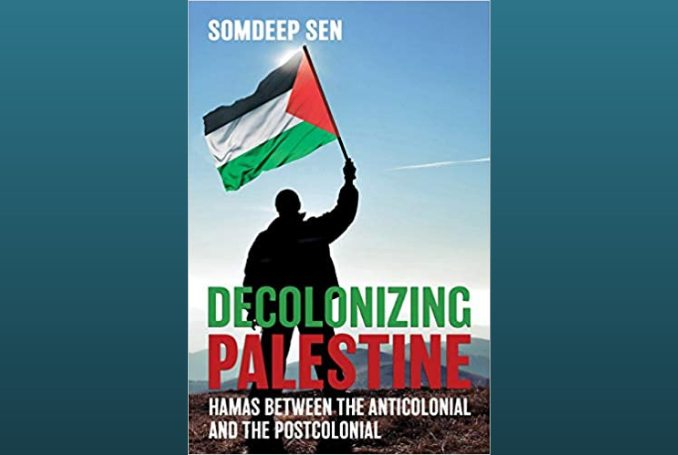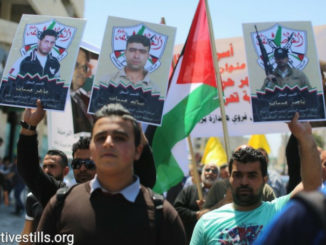
By Jim Miles
(Decolonizing Palestine: Hamas Between the Anticolonial and the Postcolonial. Somdeep Sen. Cornell University Press, New York. 2020)
A book that has a very narrowly defined title often fails to look at the larger context, either regional or global. In “Decolonizing Palestine – Hamas Between the Anticolonial and the Postcolonial” Somdeep Sen succeeds surprisingly well in placing the struggles of Hama/Gaza/Palestine well beyond the regional into a thought-provoking global perspective.
What is missing from the title is one of his fundamental themes, that of liberation. Not only is Hamas caught between the anticolonial and the postcolonial, but the idea of liberation, of freeing Palestine from the Israeli colonial-settler context is also caught between the two ideas. In short, liberation is not a point in time, not a date in a history book, but an ongoing process that precedes that noted timeline and succeeds the same.
Liberation then becomes not only just Palestine, but Palestine as a liberating idea within the global network of postcolonial acts of liberation.
Hamas
The focus is on Hamas, but does not cover its full history as a grassroots organization that in its early formation provided much-needed social services to the refugees and victims from the 1948 nakba. Sen concentrates on Hamas’ current predicament of being both a resistance force to settler-colonialism and a governing force in an area nominally ‘liberated’ from Israeli settlements, while still carrying the burden of both forwards.
One of the more striking ideas was the concept that even as Hamas is criticized for its sometimes coercive and violent control of Gaza, those very acts create and sustain the idea of ‘Palestine’. The inhabitants of Gaza recognize Hamas not just as Hamas but as the government, as the nation – as Palestinian. Even earlier than Hamas’ takeover of Gaza’s government, Sen discusses the idea that the postcolonial moment began with the Oslo Accords, and in spite of all its flaws and the poverty of its intentions, it put into writing the concept of ‘Palestine’ – undefined and subject to many onerous conditions, but still – Palestine.
Liberation in this context starts well before Oslo. Palestine has been seeking liberation since the end of World War I: first from the British empire and its League of Nations imposed mandate; and subsequently from Jewish settler-colonialism during the mandate and on into the establishment of Israel.
What is occurring in Gaza today is the ongoing struggle for liberation within both an anticolonial and a postcolonial set of ideas and actions:
“Hamas’ persistence with the simultaneous roles of resistance and assumption of governmental authority confirmed that the anticolonial and postcolonial can indeed exist in the era of colonial rule in service of the liberation struggle….[it] is also a microcosm of the entirety of the Palestinian long moment of liberation….it is the Palestinian coastal enclave that exemplifies the long moment before the withdrawal of the colonizer in its entirety, consolidated under a single leadership….”
“Despite their faults and inadequacies, both resistance and governance somehow evoked the colonized’s retort, ‘We are here, we exist, we are organized’…And even though actual liberation is far from being realized [it] has already begun under the auspices of Hamas’ rule over Gaza.”
Global Perspective and Liberation
When Sen extends his arguments to global comparisons his ideas take on a more powerful significance. His arguments are well-founded as he incorporates examples from around the world.
Sen’s correlations with other liberation struggles cover much of the rest of the world. South Africa, Zimbabwe, Tanzania, Cuba, India, Ecuador, Algeria, and North America are mentioned in his discussions. Early in the work he writes “…characterizing the socioeconomic crisis as extreme overlooks the reality that the treatment meted out to Gaza is the norm under settler-colonial rule.”
If I take my home country Canada as an extended example of North American settler-colonialism, all Sen’s arguments are applicable. Canada (and the U.S.) was attributed as being “empty land”, a “land without people.” The indigenous people were removed from the land by various devices – wars, starvation, forced removal – and the remnant populations were placed on “reservations”, the North American system of apartheid. Those that were not removed from settler society were subject to racist and discriminatory legislative and judicial action.
Physical genocide/ethnic cleansing was accompanied by cultural ‘cleansing’. The indigenous celebrations were forbidden (here on the West Coast, the tradition of the Potlatch was outlawed) and children were forcibly removed from their families in order to “civilize” the “savages”, without granting them even then the right of equality.
Under the concept of liberation, the indigenous people of Canada are still resisting colonization and all its depredations and are undergoing a “long liberation”, claiming their rights, protecting their land against militarized police forces, and still seeking equality before the law even as their inequality is written into the constitution.
Sen’s description becomes universal as in the end he suggests “that the nature of the (settler) colonial endeavor, and its ability to alienate their sense [of] self, is such that the struggle for liberation from the legacies of colonial rule may persist perpetually.” Society itself is changed, and the liberation process includes the adaptation to those changes, “the colonized are undone from their sense of self in a way that they do not have any memory of an identity sans the legacies of the colonization.” Society is changed, there is no reset button, liberation involves finding a national identity, part of that being “the national anticolonial struggle itself.”
Sen’s work, “Decolonizing Palestine – Hamas Between the Anticolonial and the Postcolonial” is a powerful and well-argued presentation on Hamas’ actions in Gaza. At the same time, he very thoughtfully extends his arguments as being part of the global system of settler-colonialism.
These arguments may sound rather esoteric in light of the brutality and racist attitudes of the colonial projects around the world, but ultimately they find the truth: no person is free, no person is liberated until all are liberated, until all the constructs of colonial settler activities, all the racism, the economic dominance, the cultural denials are deconstructed and remade into a society that provides equality in all areas to all the people of the world. We are, in that sense, all Palestinians.
– Jim Miles is a Canadian educator and a regular contributor/columnist of opinion pieces and book reviews to Palestine Chronicles. His interest in this topic stems originally from an environmental perspective, which encompasses the militarization and economic subjugation of the global community and its commodification by corporate governance and by the American government.

– Jim Miles is a Canadian educator and a regular contributor/columnist of opinion pieces and book reviews to Palestine Chronicles. His interest in this topic stems originally from an environmental perspective, which encompasses the militarization and economic subjugation of the global community and its commodification by corporate governance and by the American government.







